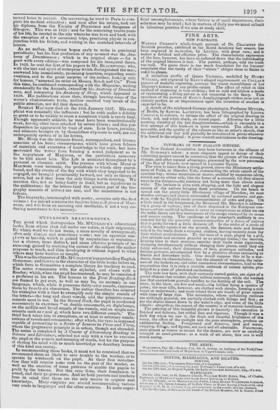PANORAMA OF NEW ZEALAND SCENERY.
THE New Zealand Association have been fortunate in the alliance of Mr. BURFORD'S talent : a more eloquent appeal in favour of their colonizing project cannot be conceived, than the picture of the scenery, climate, and other natural advantages, presented by the new panorama of the Bay of Islands, now opened in Leicester Square.
The view is taken from a rising ground, above the Missionary settle- ment of Paihi, or Marsden Vale, commanding the whole extent of the spacious bay; whose mountainous shores, studded by numerous islets, stretch out on either side, like the horns of a crescent, till they almost meet in the distance—the entrance not being more than eleven miles wide: The harbour is alive with shipping, and the light and elegant canoes of the natives bringing them provisions. On the beach is
spread out the pretty little Missionary village of Marsden ; its neat wooden cottages and church surrounded by enclosed pastures and gar- dens, with the English rustic accompaniments of cows and pigs. On a little knoll in the foreground, the Reverend Mr. Marsden is address- ing a group of natives; two of them disguised in the European cos- tutne—whose artificial ugliness is never so conspicuous as when we see the noble forms and free movements of the savage cramped by its mean and meagre casing. The smallness of the preacher's auditory is ac.. counted for by the powerful counter-attraction of a dance of natives that is going forward a little distance off. In the midst of a circle of chiefs, mostly squatted on the ground, the dancers, male and female naked to the waist, form a compact phalanx, leaving scarcely room for their violent gesticulations. To the tune of a pipe, played by a girl, (her attitude and costume graceful as an antique statue,) the dancers, keeping time in their motions, exercise their limbs most vigorously, stamping simultaneously without changing their places, until they are fairly exhausted ; their distortions of face, grotesque attitudes, and furious gestures, accompanied first by a plaintive chorus increasing to frantic and discordant yells. One would suppose this to be a war- dance, from its characteristics ; but the absence of weapons, the calm- ness of the lookers-on, and other concurrent circumstances, lead to the supposition that it is only a sociable outbreak of animal spirits, pro- longed to a state of phrensied excitement. The rude low huts, with their curiously-carved gables, are signs of a
genial climate that renders shelter seldom necessary, while the verdant hue that everywhere prevails testifies to the fertility of the soil. The trees, in the view, are few and small—the loftiest being a species of palm ; the near hills, however, are clothed with shrubs, forming a rich eopse or underwood ; and more inland there are woods of great extent with trees of large size. The mountains, whose undulating outlines are strikingly graceful, are partially clothed with foliage and fern ; as are the shores almost down to the water's edge, and some of the little islands : altogether, the aspect of the country is of romantic loveliness.
The painting of this beautiful picture is masterly : the execution is finished and delicate, but withal free and vigorous. Though it was a dark day when we saw it, the fresh and cheerful brightness of the scene, the effect of the sunlight and the pure atmosphere, produce an exhilarating feeling. Foreground and distance, land and water, shipping, foliage, and figures, are each and all admirable. Panoramas, once almost as coarse as scenes for the theatre, are now as carefully wrought as easel-pictures : as a work of art alone, this one is well worth seeing.


























 Previous page
Previous page